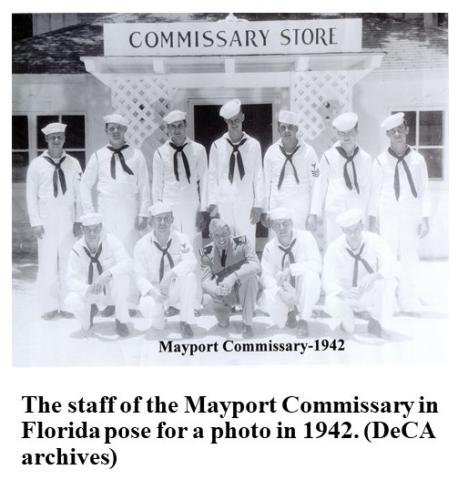HAPPY BIRTHDAY! On Oct. 13, commissaries honor Navy’s 247 years of service

NOTE: To see a video related to this release, click here
FORT LEE, Va. – On Oct. 13, the Defense Commissary Agency (DeCA) salutes the U.S. Navy on the 247th anniversary of their establishment by the Continental Congress in 1775.
Throughout its history, the commissary benefit has gained the admiration and gratitude of sailors and their families, said Marine Sgt. Maj. Michael R. Saucedo, senior enlisted advisor to the DeCA director.
“At DeCA we salute the Navy’s 247 years of service by delivering a commissary benefit that provides valuable savings to sailors, retirees and family members,” Saucedo said. “We want our sailors and their family members to know that if they’re not shopping their commissary, then they are missing out on saving at least a quarter on every dollar compared to prices at ‘outside the gate’ grocery stores – that means you save $50 on a $200 grocery bill!”
Before the Navy established its commissary operations, sailors had to find ways to procure food while they were at sea.
In the late 18th and early 19th centuries, sailors received a weekly ration that included 3 pounds of pork or beef, a pound of flour, some cheese, hardtack biscuits, and a half pint of distilled spirits or a quart of beer each day. The meat was kept in brine inside barrels to preserve it and was boiled before it could be consumed. Some captains allowed their crew to cast fishing nets and the fish was distributed among the sailors.
The food sailors had onboard was often nutritionally deficient and could spoil over a few weeks. Hardtack biscuits often became infested with maggots and weevils shortly after the ship set sail.
There was also the dilemma of sailors falling ill with scurvy, caused by a deficiency of vitamin C. As a result, sailors were required to drink a daily grog that contained spirits and a citrus beverage such as orange, lime or lemon juice. The British Navy started this tradition – leading to the use of the American slang term of “Limeys” for the British which endures to this day.
Sailors eagerly anticipated traveling to foreign ports where they could buy fresh fruits, vegetables and meat. Bumboat operators would pull alongside visiting ships to sell an array of goods including seafood, shellfish, exotic fruits and baked goods. They also charged exorbitant prices, and at times their goods were not of the best quality. But when the Navy reduced rations in 1801, bumboats became even more important to the sailors.
In the early 20th century, during the worldwide voyage of the “Great White Fleet,” the Navy began to realize that bumboats were not sufficient to serve the needs of large ships. Congress had already started taking steps to eliminate bumboats by establishing ships stores aboard every vessel and “ships stores ashore,” similar to Army commissaries that had been established in 1867.
The first Navy sales commissary opened in the Washington, D.C., Navy Yard in 1910 and operated similarly to a warehouse. Clerks stood at a counter and pulled items from the shelves for customers. Self-service style stores started gaining popularity by the late 1920s and became more widespread by World War II.
In 1946, Navy commissaries fell under the authority of the Navy Ships’ Store Office, later under the Navy Resale System Office (NRSO) in 1969 and finally the Navy Resale and Services Support Office (NAVRESSO) in 1979.
On Oct. 1, 1991, the Defense Commissary Agency was launched and assumed control of all U.S. military commissaries around the world. Today, members of the Navy community may shop at any of DeCA’s 236 commissaries worldwide. There are 60 such stores at Navy bases, plus one at the Joint Reserve Base at Naval Air Station Fort Worth, Texas.
All commissaries boast conveniences like internet ordering/curbside pickup services, self-checkouts, digital coupons, dietitian-approved resources to identify nutrient dense foods, sushi bars, hot foods, deli-bakeries, credit and debit card acceptance, gift cards and much more.
“As the Navy continues to build on its legacy, we will keep providing to their service members and their families – along with all of our eligible patrons – superior customer service and the items they want at the best possible savings,” Saucedo said.
-DeCA-
About DeCA: The Defense Commissary Agency operates a worldwide chain of commissaries providing groceries to military personnel, retirees and their families in a safe and secure shopping environment. Commissaries provide a military benefit, saving authorized patrons thousands of dollars annually on their purchases compared to similar products at commercial retailers. The discounted prices include a 5-percent surcharge, which covers the costs of building new commissaries and modernizing existing ones. A core military family support element, and a valued part of military pay and benefits, commissaries contribute to family readiness, enhance the quality of life for America’s military and their families, and help recruit and retain the best and brightest men and women to serve their country.
